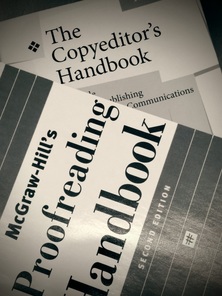
I snagged a new day job a year ago, and my editing since then has been mostly limited to the small amount of freelance work my schedule allows. I was a catalog proofreader; now I’m a content manager for an account at a creative agency. Content manager may be one of the most vague job titles I’ve ever heard. For me, it means I make sure client feedback is implemented correctly across a whole slew of Word and Excel documents. There's a lot of copying and pasting, a lot of critical thinking and memory, a lot of diplomacy and collaboration, a little bit of proofreading. What there’s not a lot of is editing.
Not being the final say in matters of style and adherence to editorial guidelines was a new and uncomfortable position for me. I found myself on the other side, the writers’ side, passing off documents to the agency’s copyeditors and hoping for the best. At first, I couldn’t help but glare at every edit, my mind whirling with thoughts like, Why is this capitalized? Why isn’t this hyphenated? I wouldn’t have done that. Intensifying matters was the fact that I’d also interviewed for a copyeditor position at this same agency and been passed up.
I realized that I had to check myself before I wrecked myself. I didn’t need to prove anything to anyone; editing wasn’t my job anymore, and I needed to respect the knowledge and experience of the copyeditor I was working with. More useful than a competitive spirit would be a collaborative one, one eager to learn from others with the same passions. I soon found that this copyeditor knew rules, guidelines, and history that I didn’t, and that she was the best person to go to when we were both trying to work through a tricky style decision.
Working in solitude can fuel an instinctual competitive drive when a challenger appears in the arena. But the important lesson I’ve learned is that the person I want to see as competition can turn out to be my greatest ally.
Not being the final say in matters of style and adherence to editorial guidelines was a new and uncomfortable position for me. I found myself on the other side, the writers’ side, passing off documents to the agency’s copyeditors and hoping for the best. At first, I couldn’t help but glare at every edit, my mind whirling with thoughts like, Why is this capitalized? Why isn’t this hyphenated? I wouldn’t have done that. Intensifying matters was the fact that I’d also interviewed for a copyeditor position at this same agency and been passed up.
I realized that I had to check myself before I wrecked myself. I didn’t need to prove anything to anyone; editing wasn’t my job anymore, and I needed to respect the knowledge and experience of the copyeditor I was working with. More useful than a competitive spirit would be a collaborative one, one eager to learn from others with the same passions. I soon found that this copyeditor knew rules, guidelines, and history that I didn’t, and that she was the best person to go to when we were both trying to work through a tricky style decision.
Working in solitude can fuel an instinctual competitive drive when a challenger appears in the arena. But the important lesson I’ve learned is that the person I want to see as competition can turn out to be my greatest ally.
 RSS Feed
RSS Feed